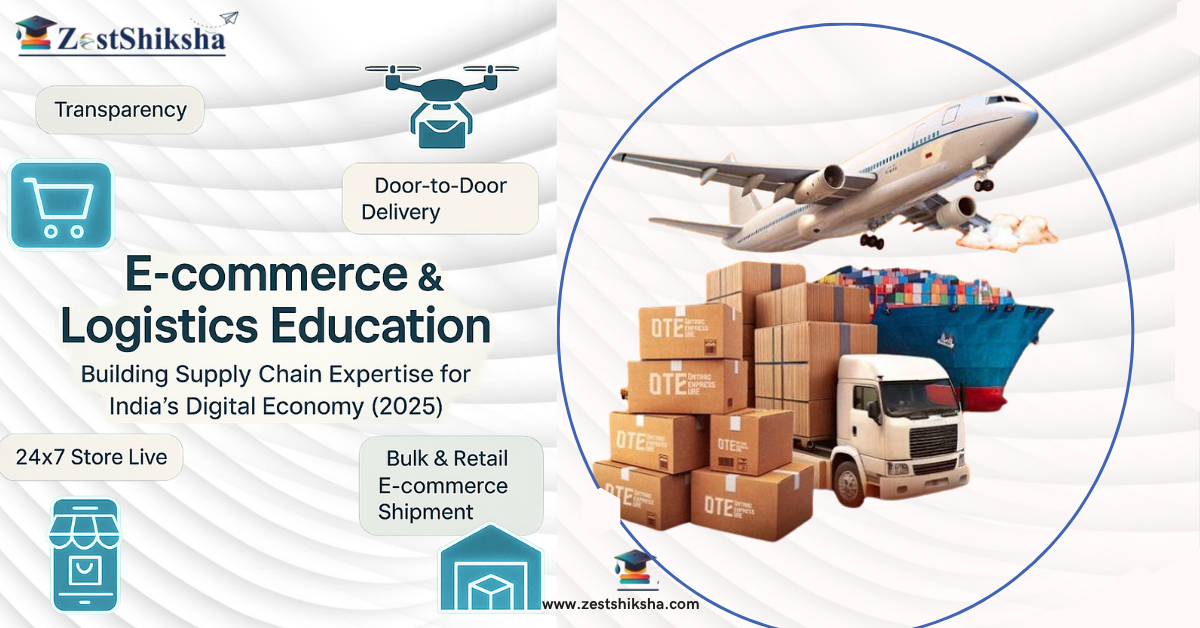E-commerce & Logistics Education: Building Supply Chain Expertise for India’s Digital Economy (2025)
Introduction – Why Students Must Learn E-commerce & Logistics
The rapid growth of India’s digital economy has created a massive demand for professionals skilled in
e-commerce and logistics education in India. With online marketplaces like Shopify, Etsy, Amazon, and eBay
becoming key business channels, students at every level—from elementary to postgraduate—must develop expertise in these systems.
Understanding supply chain processes, courier networks like Delhivery and Blue Dart, and the fundamentals of online retail
is no longer optional; it is essential to building future-ready careers. As businesses depend on efficient delivery and cross-border logistics,
there’s a rising need for professionals who can manage inventory, ensure smooth last-mile delivery, and reduce operational costs.
This blog explores why students must focus on supply chain management courses 2025, how
e-commerce logistics training programs prepare them for global opportunities, and why early education in these areas is
the key to thriving in India’s fast-growing digital economy.
Why E-commerce & Logistics Education Matters in 2025
The global shift to digital retail has reshaped job markets, making e-commerce and logistics education in India
vital for every student. Today, industries face significant skill gaps in managing warehouse operations, inventory, and last-mile delivery.
Companies like Delhivery and Ecom Express now handle millions of packages daily, demanding skilled professionals who
understand routing, automation, and customer satisfaction metrics. With online retail expanding through Amazon, Shopify, Etsy, and eBay,
understanding integrated systems is critical for career growth. Moreover, supply chain management courses 2025 now
include modules on AI, automation, and digital payments, preparing learners for new-age logistics. Students aiming to succeed must master
digital economy skills for students, from using e-commerce dashboards to working with courier APIs for seamless fulfillment.
Those who embrace early education in this domain can position themselves as leaders in India’s rapidly evolving logistics and retail ecosystem.

Key Skills for India’s Digital Economy
Students seeking success in the digital age must acquire key competencies taught in
supply chain management courses 2025. These include warehouse management, inventory tracking, order fulfillment,
and understanding courier operations with companies like Delhivery, FedEx, and DTDC. In addition,
e-commerce logistics training programs teach students how to integrate with platforms like
Shopify, Amazon, Etsy, and eBay, helping sellers automate order flows and manage returns effectively.
A focus on data analytics, AI-driven demand forecasting, and digital payment systems also gives students a competitive advantage.
Elementary, undergraduate, and postgraduate learners benefit by gaining not just technical skills but also insights into how the
future of e-commerce jobs in India will evolve with cross-border trade and sustainability.
By mastering these capabilities, students can effectively utilize the e-commerce ecosystem while preparing for diverse roles across logistics, operations, and retail management.
Top Courses & Institutes for E-commerce & Logistics Education
To meet industry needs, several institutions now offer e-commerce and logistics education in India tailored
for students at all levels. Universities and business schools, including IIMs and private institutes, provide specialized
supply chain management courses 2025 covering inventory planning, courier partnerships like Delhivery,
and online retail integration. For flexible learning, students can explore e-commerce logistics training programs
on Coursera, edX, and Udemy, which feature modules on Shopify store management, Amazon FBA, Etsy marketing, and cross-border eBay selling.
Short-term diplomas help elementary and undergraduate learners build fundamentals, while MBAs and executive programs suit postgraduate
students looking to lead logistics operations. To explore advanced study options,
explore MBA programs alongside logistics courses
to expand your career opportunities. Many of these courses also include live projects, teaching students how to work with courier APIs,
optimize last-mile delivery, and manage omnichannel retail systems—ensuring they graduate career-ready in India’s growing digital economy.
Career Opportunities in Logistics and E-commerce
The demand for trained talent in logistics and retail creates exciting career opportunities in logistics and e-commerce
for students. Roles such as supply chain analyst, warehouse manager, courier operations head, and e-commerce strategist are booming,
especially as businesses rely on Delhivery and similar networks for timely deliveries. Students trained through
e-commerce logistics training programs and supply chain management courses 2025 can work with online platforms
like Amazon, Shopify, Etsy, and eBay, assisting sellers in automating fulfillment and reducing delivery times.
Salaries for freshers in this field start around ₹4–7 lakh per year and can exceed ₹20 lakh annually for mid-level professionals
managing cross-border trade and tech-driven logistics systems. As the future of e-commerce jobs in India shifts toward
AI-powered inventory systems and sustainable delivery networks, students with early expertise will stand out in this high-growth sector.

How Students Can Choose the Right Program
Selecting the ideal learning path is crucial for students aiming to excel in e-commerce and logistics education in India.
Factors such as accreditation, faculty expertise, and placement records play a vital role. Undergraduate and elementary students can
start with short-term e-commerce logistics training programs focusing on courier integration, Shopify store setup,
and working with networks like Delhivery for fulfillment projects. Postgraduate students may prefer advanced
supply chain management courses 2025 offered by IIMs or global universities, which emphasize AI tools, global sourcing,
and leadership roles. Unsure whether to study online or offline?
Learn which format suits your logistics education
and career path. By aligning education with career goals, learners can utilize these platforms and courier systems effectively while building
a robust foundation for India’s evolving digital economy.
Future of Supply Chain Careers in India’s Digital Economy
By 2030, India’s e-commerce market is projected to surpass $350 billion, driving exponential demand for logistics and supply chain experts.
Students investing in e-commerce and logistics education in India today will be at the forefront of this revolution.
As companies like Delhivery, DHL, and Blue Dart adopt automation, AI, and green logistics, professionals skilled in these
areas will secure top roles. Knowledge gained from supply chain management courses 2025 and
e-commerce logistics training programs enables students to work globally, managing cross-border trade via
Shopify, Etsy, Amazon, and eBay integrations. Sustainability and digital payments will also create new roles, making
digital economy skills for students indispensable.
Conclusion – Preparing Students for the Digital Commerce Era
In 2025, mastering e-commerce and logistics education in India is no longer a niche choice; it is essential for students at every educational level.
Whether learning courier operations with Delhivery, managing online stores on Shopify, Amazon, Etsy, or eBay,
or completing supply chain management courses 2025, students gain tools to thrive in the digital economy.
E-commerce logistics training programs prepare learners for diverse roles, from managing warehouses to optimizing AI-driven delivery routes.
For India’s future professionals, building expertise now ensures they can utilize the e-commerce system effectively and efficiently,
seize high-paying job opportunities, and contribute to a fast-growing sector. For additional guidance and career support,
visit Zest Shiksha for resources to help students master the e-commerce ecosystem.



